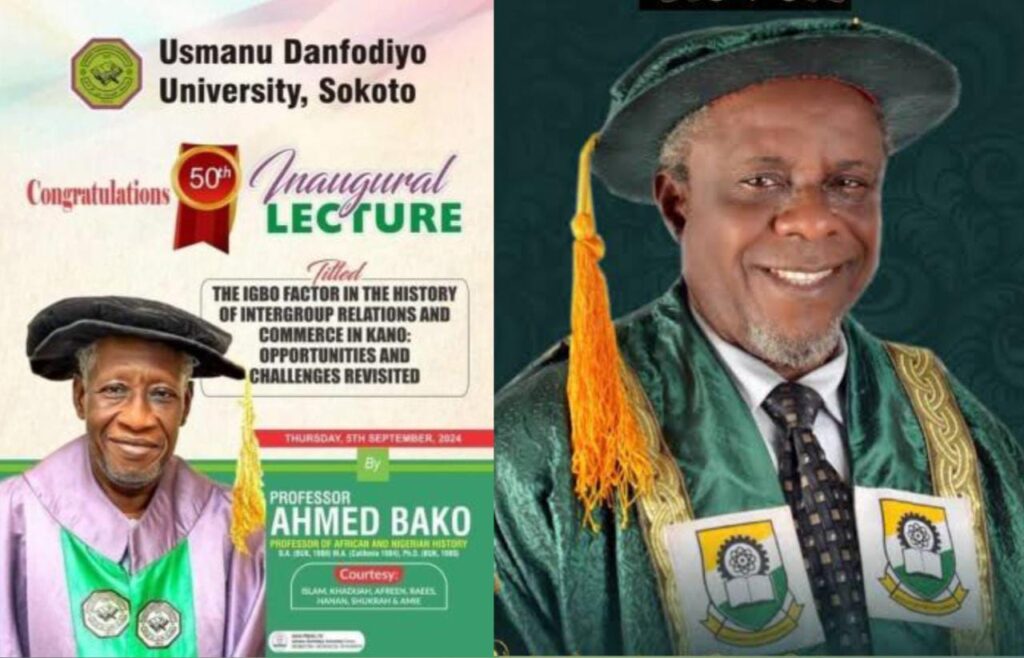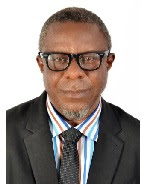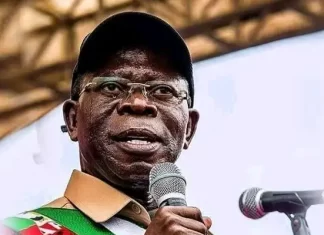Ahmed Bako’s Inaugural Lecture: Exploits in intellectual shallow thinking

By Ellis Idemobi
I want to begin this piece by congratulating Prof Ahmed Bako on his inaugural lecture titled – “The Igbo Factor in the History of Intergroup Relationships and Commerce in Kano: Opportunities and Challenges Revisited”. It is the way to go for every renowned Professor to present an inaugural lecture at some point towards the peak of their career. Given my deep knowledge of what inaugural lectures usually seek to achieve and more importantly as someone who recently delivered an inaugural lecture, I have wondered what could have been Prof Bako’s motive in this inaugural lecture presentation.
By tradition and across Universities in Nigeria and indeed all over the world, an inaugural lecture is given by Professors who would have come not only to celebrate their research and learning achievements but also to present an overview of their contributions to their field of study highlighting the latest developments in their field of learning and how these affected or supported public policy dialogue and shifts. As a respected Professor of History and the narratives in this inaugural lecture, one will wonder what Professor Bako had been advocating and teaching his students over the years about Nigerian unity and how these teachings and indeed the inaugural lecture had affected or will affect public policy.
Though I observed over twenty acrimonious and unsubstantiated claims against the Igbo in Prof Bako’s inaugural lecture but as a Professor of Business I have opted to challenge only a few that border on the commercial exploits of Ndigbo in Kano in particular and Nigeria in general. I will now try to take the two I want to deal with just one after the other.
First, the assertion that Igbos in Kano were self-centered towards the development of their host communities is to say the least most fallacious and unintellectual. Hear Prof Bako- “the Igbo in actual fact from the 1950s started sending their sons and daughters to Europe and America for higher education; all with the hope of eventual domination of the country; not necessarily for developing it for the benefit of the nation.” It beats my imagination that an intellectual of Prof Bako’s pedigree did not reckon with the meaning of Gross Domestic Product (GDP) as the aggregate productivity of all individuals in a nation. The legendary Adam Smith in his Wealth of Nations hypothesis put forth his philosophy of free markets, where he argued that individuals pursuing their own self-interest would result in the best outcomes for society as a whole.
Therefore for all we know, wealth is the product of the individual mind. It is the result of man’s ability to think applied to the sphere of production and trade. In other words it is the abundance of valuable financial assets or physical possessions which can be converted into a form that can be used for transactions. An individual possessing a substantial net worth is seen as wealthy. Aside natural resources, wealth belongs to the individual who produced it and an aggregation of the wealth of all individuals form the wealth of the nation. It is therefore clear shallow thinking and extremely unintellectual for Prof Bako to allow his Igbophobia to push him to posit that Igbos in the nation worked only for themselves without contributing to the growth of the society where they operated. It is common knowledge that the Igbos are the engine of Nigeria’s economic development with their world-acclaimed entrepreneurial drive. It is hard to understand why Prof Bako failed to acknowledge the enormous contributions of Ndigbo to the development of Kano in particular and Nigeria in general. It is incontrovertible that despite political marginalization and perpetual hatred, an average Igbo man has the resilience to uplift himself economically, develop their host communities, make every place they settle a home, and treat neighbours as a family. Perhaps what worries people like Prof Bako is that Igbos in Kano remained progressive and enterprising even as government machinery and often pockets of hatred are used to stifle their endeavours.
Second, Prof Bako equally wrongly asserted that ‘broadening base of the Igbo in Kano and their success has given rise to criticisms against them by the indigenes who consistently blame them for taking over enterprises as well as landed properties which would have otherwise be under their control. The Igbo have also been accused of constituting a drain on Kano economy in terms of repatriating funds to develop their homeland’. Bako went further to claim that “my view is that because of ethnic solidarity, Igbo traders gradually marginalized or even displaced large number of Hausa traders.”
On this assertion, he sought to provide some evidence ‘A typical example of a Hausa man displaced by the Igbo was Alhaji Abubakar Makwarari. He became a textile retailer in 1974 in a stall he rented from Alhaji Salisu Barau Zage at the cost of £6,000 per annum. In 1986 he was ejected due to his failure to pay the new rent of £30,000. Chief David Obi Okonkwo paid the stated amount and occupied the stall. Many other Hausa traders were displaced by the Igbo who were ready to pay high rents.” Imagine these accusations against hardworking Igbo traders. If Prof Bako was inputting ethnic solidarity, it would have made sense if the owner of the shop was Igbo. But this was not the case. As another commentator Ikechukwu Amaechi put it rhetorically ‘so, how can Alhaji Zage’s decision to eject Alhaji Makwarari from his property be recorded as a crime by the Igbo? Was Alhaji Zage himself Igbo? It is hard to imagine that an inaugural lecturer can make such baseless assumptions.
Prof Ahmed Bako sought to conclude his jaundiced lecture by asserting that “there is no doubt in the fact that the broadening base of the Igbo in Kano and their success has given rise to criticisms against them by the indigenes who consistently blame them for taking over enterprises as well as landed properties which would have otherwise been under their control. The Igbo have also been accused of constituting a drain on Kano economy in terms of repatriating funds to develop their homeland.” To the contrary, Ndigbo have rather made immense contributions to the economic development of Kano and Nigeria. No one doubts that they have worked so hard for their money and the prosperity of the nation. Just like in Lagos, Igbos have never been accused of grabbing land without payment. Ironically Prof Bako did not say how Alhaji Zage who obtained four times the rent paid to eject Alhaji Makwarari used the enormous amount of money paid to him. Hence to accuse Igbos of taking over shops, lands or enterprises would have otherwise been under the control of indigenes, is absurd and makes no sense whatsoever.
In my candid opinion so much seem to be wrong with this inaugural lecture. The innuendos, stereotypes and lies are to say the least excruciating. If this type of thinking can be found so predominant among academics who mold future minds, one would not go far to offer reasons why Igbos are currently victims of ethnic profiling and prejudices almost all over Nigeria. This is indeed tragic considering that we are talking about a people who have labored so hard to bring much of the economic development we have in Nigeria today.
Okey Anueyiagu, author and newspaper columnist who was born and raised in Kano and has a wide knowledge of the issues had this to say-“I have a personal objection to many of the statements made by this lecturer. I am confident that I qualify to question his positions, because I was a part and parcel of the Kano history pre and post-independence. I was born and bred in that city, and my family was fully entrenched in the politics, culture and business of Kano,” he wrote. Reno Omokri in underscoring the significant role of Ndigbo in Nigeria’s economic development had this to say – “If instead of investing in other zones in Nigeria, Igbos invest only in the South East, the region will not need iederal allocations. Much of the Internally Generated Revenue in Lagos, Kano and Kaduna are disproportionately generated by the Igbos. Oil will come and go, but the ingenuity of Igbos will be forever. Appreciate them,” he advised.
Indeed this is the kind of appreciation Prof Bako and his likes do not offer. The tragedy of it all is how far Prof Bako has spread this Igbophobia with concomitant negative impact on Nigerian unity. Perhaps Prof Bako and those who think like him deserve some pity. Chidi Odinkalu, a former Chairman of the Nigerian Human Rights Commission, said Ahmed Bako should be pitied. “If a man – or anyone at that – has spent over 40 years of his life spouting this kind of stuff even with the best of intentions as seems evident on the face of this paper, I will take pity on him and pity even more the students who endured it.” I fully concur with Odinkalu’s position. Chima Onuoha, a Professor of Management in his rejoinder asked why Prof Bako did not accuse his Hausa brothers of acting ‘Shylock’ by quadrupling rents for their own brothers. Hear him- ‘On displacing Hausa traders in Kano and other places in the North by paying higher rents… what did he tell his shylock Hausa brothers/landlords who quadrupled the rents? They were both insensitive and wicked to their fellow poor Hausa traders and exploitative to the Igbo traders’.
In conclusion, I would want to draw the attention of Prof Bako and other Igbophobians to Miriam Novak’s breathtaking speech at the United Nations General Assembly on 16th June, 2024, where she extolled Jewish contributions to the world and humanity… after numerous schemes against the Jewish race, including the holocaust. In the same way the Igbos are no doubt the most hated and persecuted race in Nigeria, yet they have given very good accounts of themselves, due largely to their God-given attributes that make them wonderful wealth creators and economic change agents. Although we cannot claim there are no bad Igbos just like you find everywhere however this level of vilification of hardworking Igbos like Prof Bako’s are not happening in a vacuum, but in a Nigeria that — for decades — had demonized Igbos as “enemies of the society’ due to their ingenuity and hardwork. Whatever Prof Bako’s lecture tirades are pointing to would not have been possible without this deeply entrenched hatred of the Igbo people in contemporary Nigerian psyche. There are over 250 ethnic groups in Nigeria and the Igbos are the group so hated as to be always profiled like in Prof Bako’s style. Is it a crime for a people to be competitive, mercantile and hard working? All over the world, the Igbo mercantile and competitive spirit are being studied for replication in other climes. We should end this culture of hatred of the Igbos in Nigeria and I believe there are millions of right-thinking, courageous and righteous Nigerians who would always defend Ndigbo and the role they are playing to make Nigeria great and as such would vastly outnumber millions driven by Igbo-hatred, greed and indifference.
- Ellis Idemobi is a Professor of Business and Entrepreneurship, former Deputy Vice Chancellor and 11th Inaugural Lecturer at Chukwuemeka Odumegwu Ojukwu University (formerly Anambra State University) Igbariam













